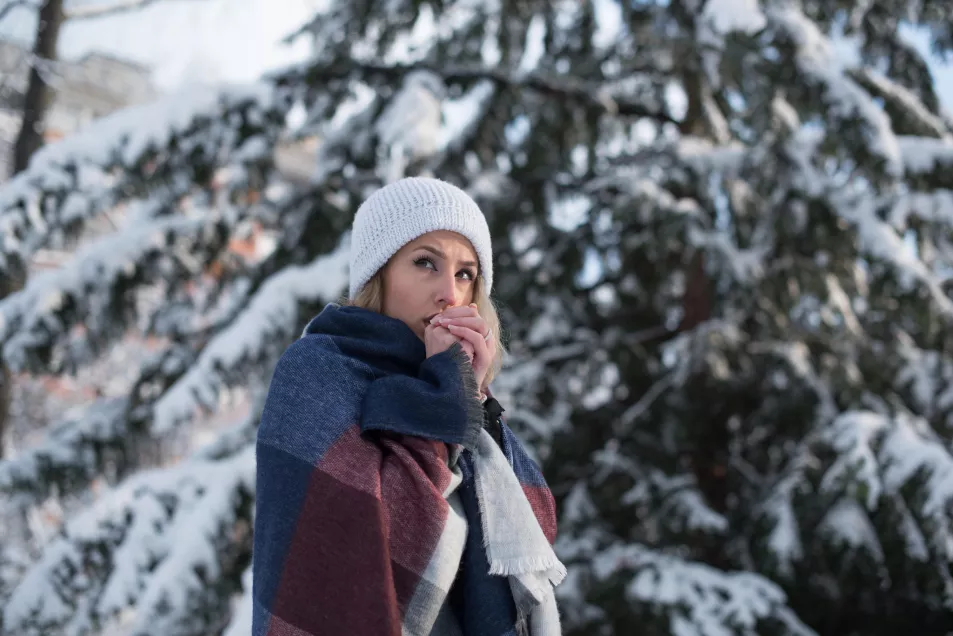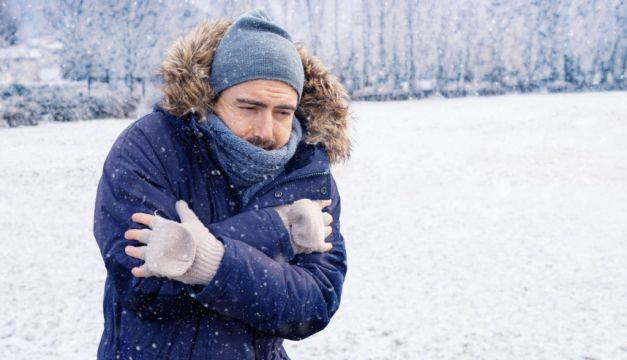With the coldest day since 2010 recorded in Ireland and ice warnings in place for a large part of the country, the wintry weather we’ve been having is set to continue.
Wherever you live, if you have to venture outside this week, it’s vital you bundle up in your thickest coat, scarf, hat and gloves, to protect yourself against the chill.
➡️❄️ Today was provisionally the coldest day at our weather stations since 2010 ❄️⬅️ ⤵️ https://t.co/HbdvpC4eox
— Met Éireann (@MetEireann) December 12, 2022
Advertisement
But have you ever wondered why sub-zero temperatures have such an impact on us physically?
Here, doctors talk through how extreme cold affects our bodies.
Shivering

“In extreme cold, when the temperature drops, the body diverts blood flow from the surface, to allow the body’s core to stay warmer longer,” says Dr Paul Ettlinger, a GP.
The normal core temperature is 36.5 to 37.5 degrees Celsius, which is why your muscles react when you’re in a significantly cooler environment.
“Muscles throughout your body start to contract to cause shivering, which generates warmth by creating energy,” explains Dr Sarah Brewer, medical nutritionist and author.
Except for elderly people, she adds: “This shivering response may be greatly reduced with age, and may be absent in the elderly.”
Flushed skin
Ruddy cheeks and a Rudolph-esque nose are another common occurrence when the mercury plummets.
“When it’s cold and windy outside, our cheeks will experience windburn and may have a flushed appearance as blood vessels dilate,” explains Ettlinger.
“The skin may also feel dehydrated and dry, as the skin’s protective layer has been compromised and becomes more vulnerable to damage.”
Your extremities can be particularly susceptible to the cold, he adds: “The skin, especially the tips of our fingers and toes, feels numb and may change to a greyish colour.”
Runny nose

One of the most annoying things that happens when you step outside in icy conditions is a runny nose.
“The nose’s job is to warm and humidify the air we breathe in, to prepare it for the lungs,” says Ettlinger.
“When it’s cold, the blood flow in the nose increases, which in turn increases the fluid in the nose, and some of that fluid will run out of the nose.”
Respiratory problems
“Exposure to cold air can worsen respiratory conditions, such as allergic rhinitis, asthma and chronic obstructive pulmonary disease (COPD),” says Brewer.
That’s why going outside can feel so uncomfortable in freezing conditions: “Breathing cold air causes inflamed airways to constrict, so you cough, wheeze and become short of breath, with tightness in the chest.”
And why you need extra layers of insulation: “Even cooling the face can trigger this response, so it’s worth wearing protective clothing over your face in cold weather, as well as using your preventer inhaler regularly as prescribed.”
Frostbite

In more severe cases of sub-zero exposure, frostbite can occur, usually affecting “the extremities, such as hands, feet, nose, lips and ears,” Ettlinger says.
“It is the body’s response to the cold, where blood flow to the vital organs increases, but in turn, blood vessels narrow and blood flow slows down to the extremities.”
Symptoms usually start with the affected parts feeling cold and painful, or a ‘pins and needles’ sensation. If you think you may be suffering with frostbite, call your GP for advice.
Hypothermia
When the core body temperature drops below 35 degrees, there’s the risk of a more serious medical condition.
“Hypothermia occurs when your body loses heat faster than it can be generated,” Brewer says. “It is sometimes called a ‘silent killer’ as many victims are unaware they are at risk.”

Along with symptoms of shivering, pale or blue skin or lips, and slurred speech, Ettlinger warns: “Hypothermia can also affect your cognitive performance, making you feel drowsy and confused. It can also cause feelings of weakness and extreme tiredness.”
Again, the elderly may be more susceptible, Brewer adds: “Older people, in particular, are more sensitive to the effects of falling temperature and are less likely to register they are cold.”
This is a medical emergency that needs to be treated in hospital, so if you think someone has hypothermia, call 999 or go to A&E immediately.







